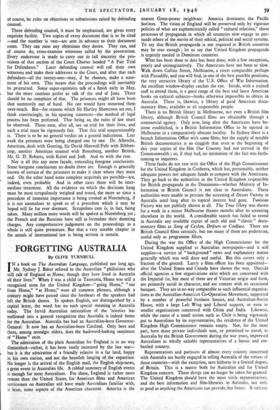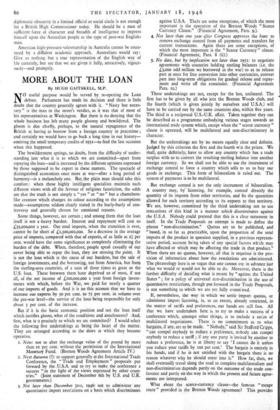FORGETTING AUSTRALIA
By CLIVE TURNBULL
IN a book on The Australian Language, published not long ago, Mr. Sydney J. Baker refered to the Australian "philistines who still talk of England as Home, though they have lived in Australia all their lives." When I was a child in Tasmania, Home was still a recognised term for the United Kingdom—" going Home," "out from Home," "at Home," were all common phrases, although a century might have passed since the forebears of the speakers had left the British shores. In spoken English, not distinguished by a capital letter, the word has no such special meaning in Australia today. The fervid Australian nationalism of the 'nineties has mellowed into a general recognition that Australia is indeed home for the Australian. Australia has had an Australian-born Governor- General. It now has an Australian-born Cardinal. Only here and there, among nostalgic elders, does the backward-looking sentiment of "Home" exist.
The admiration of the plain Australian for England is in no way diminished—rather, it has been vastly increased by the late war— but it is the admiration of a friendly relative in a far land, happy in his own station, and not the heartfelt longing of the expatriate. No longer is the arrival of the English mail, the English ship-news, a great event in Australian life. A cabled summary of English events is enough for most Australians. For these, England is rather more remote than the United States, for American films and American servicemen on Australian sail have made Australians familiar with, at least, some aspects of the American character. America is the nearest Great-power neighbour. America dominates the Pacific horizon. The vision of England will be preserved only by vigorous policies of what are euphemistically called "cultural relations," those processes of propaganda in which all countries nOw engage to per- suade others of the merits of their ethical, political and social systems.
To say that British propaganda is not required in British countries may be true enough ; let us say that United Kingdom propaganda is urgently needed in Dominion countries.
What has been done to date has been done, with a few exceptions, poorly and unimaginatively. The Americans have not been so slow.
Walk down Collins Street, Melbourne, a street comparable perhaps with Piccadilly, and you will find, in one of the best possible positions, the very attractive library of the U.S. Office of War Information.
An excellent window-display catches the eye. Inside, with a trained staff to attend them, is a good range of the best and latest American books on cultural subjects—books otherwise impossible to obtain in Australia. There is, likewise, a library of good American docu- mentary films, available to all responsible people.
There is no British library in Melbourne, not even a British film library, although British Council films are obtainable through a commercial agency. Only now, long after the Americans have be- come established, is a British Information Office to be opened in Melbourne in a comparatively obscure locality. In Sydney there is a branch Information Office with some films, but the supply of notable British documentaries is so sluggish that even at the beginning of this year copies of the film Our Country had not arrived in the Commonwealth ; or, if they had, no intimation of the fact was forth- coming to inquirers.
These faults do not rest with the Office of the High Commissioner for the United Kingdom in Canberra, which has, presumably, neither adequate powers nor adequate funds to compete with the Americans.
They go back to the authorities in the United Kingdom responsible for British propaganda in the Dominions—whether Ministry of In- formation or British Council is not clear to Australians. These authorities were unable to procure the screening of Desert Victory in Australia until long after its topical interest had gone. Tunisian Victory was not publicly shown at all. The True Glory was shown for a week in a minor Melbourne theatre months after its screening elsewhere in the world. A considerable search has failed to reveal in Australia any available copies of such old and " classic " docu- mentary films as Song of Ceylon, Drifters or Coalface. There are British Council films certainly, but too many of them are pedestrian, useful only as programme fillers.
During the war the Office of the High Commissioner for the United Kingdom supplied to Australian newspapers—and it still supplies—a service of " background " news and explanatory matter
generally which was well done and useful. But this covers only a fraction of the ground. Lately a films officer has been appointed—
after the United States and Canada have shown the way. Outside official agencies a few organisations exist which are concerned with the Imperial tie, but most of these are of Victorian origin and form, are primarily social in character, and are content with an occasional banquet. They are in no way comparable to such influential organisa- tions as the Australian-American Co-Operation Movement, supported by a number of powerful business houses, and Australian-Soviet House, with a large Left Wing and Liberal support, or even to smaller organisations concerned with China and India. Likewise, while the cause of a small nation such as Chile is being vigorously put to Australians by its representative, the residence of the United Kingdom High Commissioner remains empty. Nor, for the most part, have those private individuals sent, or permitted to travel, to Australia by the British Government during the war years, impressed Australians as wholly suitable representatives of a heroic and em- battled country.
Representatives and partisans of almost every country concerned with Australia are busily engaged in telling Australia of the virtues of those countries—with the exception, save hitherto in a limited degree, of Britain. This is a matter both for AuStralian and for United Kingdom concern. These things can no longer be taken for granted. The United Kingdom should have the most virile representatives, and the best information and film-libraries in Australia, not only as good as anything the Americans can provide, but better. A reticent diplomatic obscurity in a limited official or social circle is not enough for a British High Commissioner today. He should be a man of sufficient force of character and breadth of intelligence to impress himself upon the' Australian people as the type of post-war English- man.
American high-pressure salesmanship in Australia cannot be coun- tered by a diffident academic approach. Australians would say: Give us nothing but a true representation of the English way of life certainly, but see that we are given it fully, attractively, vigour- ously—and promptly.



























 Previous page
Previous page